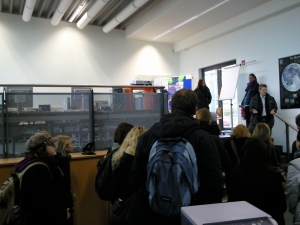Here we are again!!
After our rather extensive winter-break, we are really looking forward to provide you with new information on New Media in foreign language teaching.
In our entry from November the 24th we spoke about a field trip to the Alfred Wegener Schule (AWS) in Kirchhain. This plan, however, was delayed due to illnesses and the winter holidays. But last week we managed to realize our visit to the school and got information about locations, equipment, teaching concepts, etc..
It was really interesting to see which ideas and proposals that we had discussed in the seminar were put into practice in the school. We visited, for instance, a computer lab that was included in a library. In this computer lab, also called ‘Lernwerkstatt’, the students can improve their language skills via learning software which is installed on the computers.
Next to the ‘Lernwerkstatt’ there existed also other computer labs for younger and older students. According to the subjects and their demands these rooms were equipped with, learning islands (Lerninseln), individual computers or a SMART board.
In the following our guide Mr. Schouler, an informatics and English teacher from the AWS, found time to answer some of our questions that we previously posted in our blog and which you will find below this article.
I got the opportunity to ask Mr. Schouler in which subjects and for which purposes students use the new media. He replied that the new media is not only used in order to gather information and present it, as for example in projects, but that there are certain computer lessons in which young students  are thought basic computer skills, such as how to save documents, create own folders, working with Microsoft word, etc. .
are thought basic computer skills, such as how to save documents, create own folders, working with Microsoft word, etc. .
Another aspect I was curious about was the question, as students are obviously well trained, if all the teachers know how to use the new media appropriately. He answered that some years ago all teachers were trained in using the new media in a seminar. In the following, however, it became clear that every teacher designs his lesson according to his or her own principles. This means that older teacher who follow a more traditional concept, reject the computer whereas mostly younger colleges are eager to include them in their lesson planning.
So we have seen that already today new media is incorporated into the teaching process. It is, however, still a matter of motivation and willingness of each individual teacher that decides whether new media is used or not.